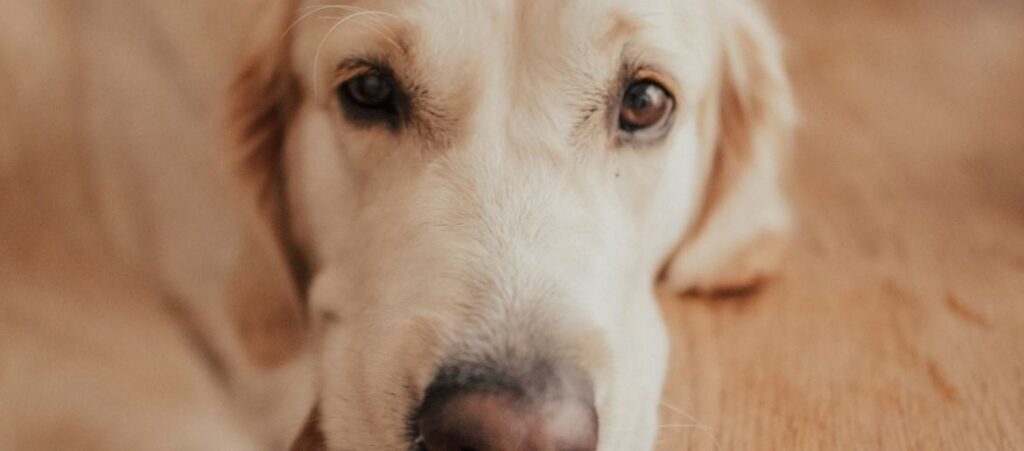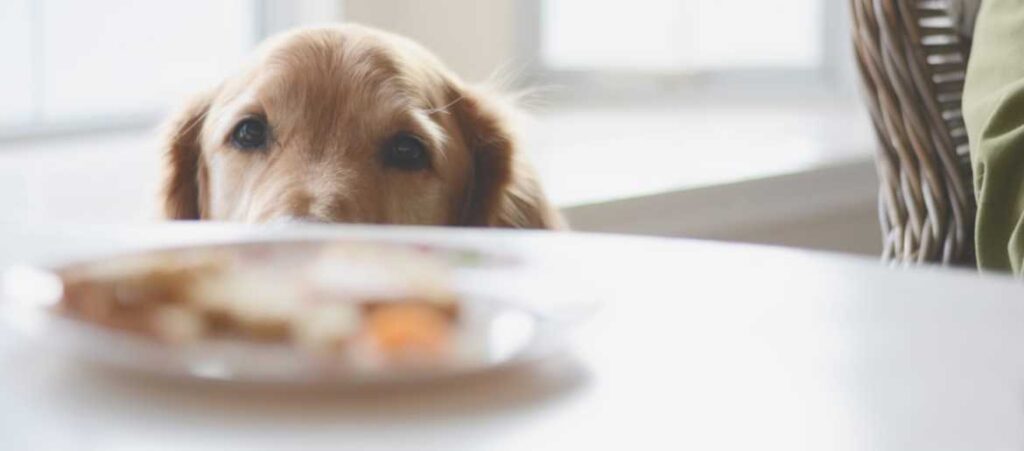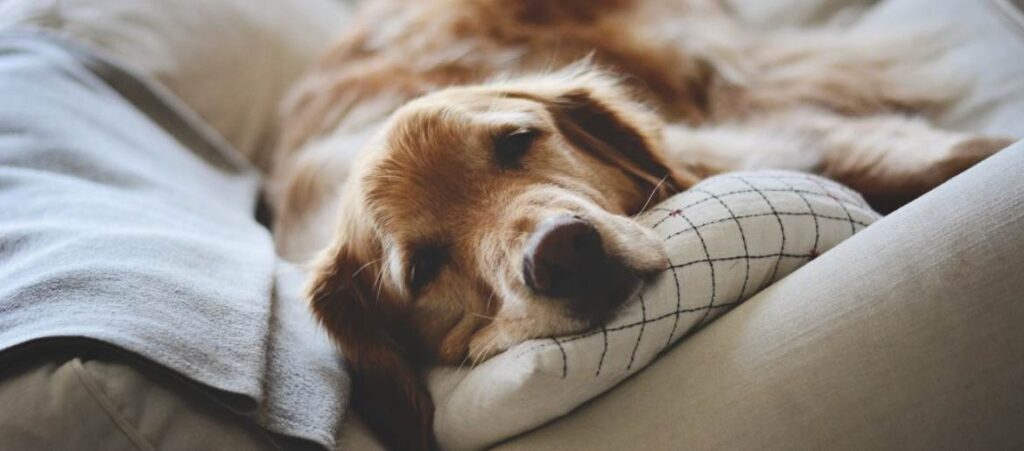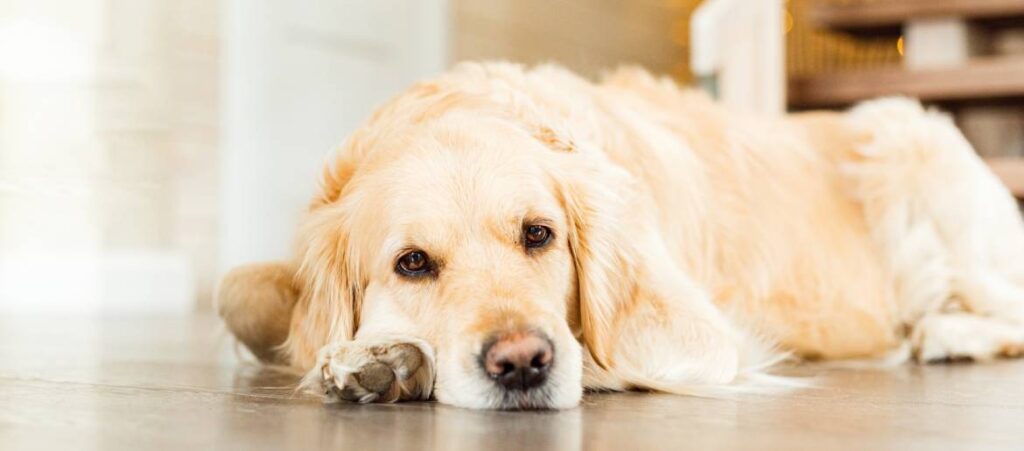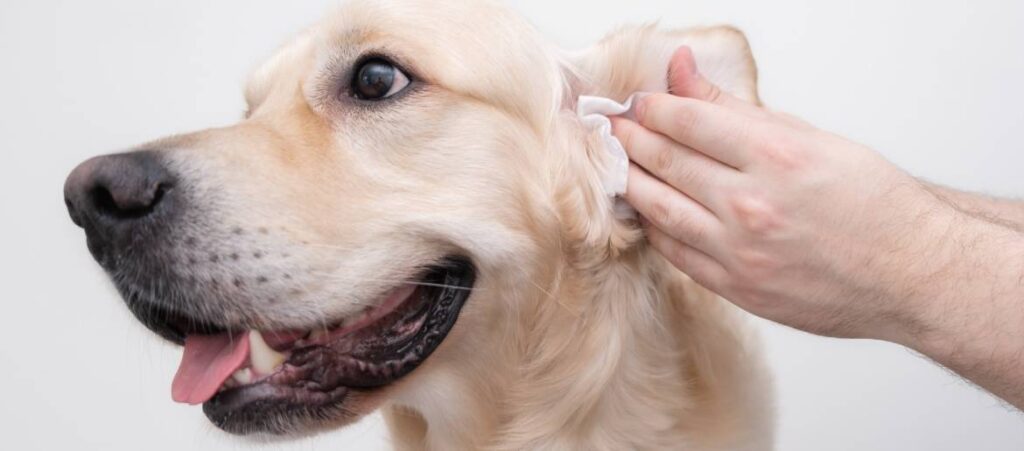Owing to Golden Retriever’s genetic makeup and food-loving attribute, these breeds are more likely to be overweight. Besides this, these dogs know how to please their owner to get some extra treats. So, if you have a Golden Retriever, obesity might be an issue that you must manage. But how to know whether your Golden Retriever is overweight or not?
To know if your Golden Retriever is overweight or not, you can do some visual analysis. A healthy Golden Retriever has curves and a tucked-up area from ribs and legs when observing from the sides. Besides this, it must have an hourglass figure and ideal weight.
But when a Golden Retriever is overweight, it has a rectangular shape with a tummy. Further, obese Retriever is less active and behaves abnormally.
Like humans, obesity and excess weight is harmful to your pal. Moreover, an overweight pet is prone to various medical conditions. Hence, just a few extra pounds in your Golden Retriever’s weight can drastically degrade its lifespan.
Thus, to help you, I will be disclosing few ideas to know if your Golden Retriever is overweight or not as your read further. But before digging into the topic, let us take a sneak peek at the ideal weight of a Golden Retriever and its struggle with obesity.
Can Your Golden Retrieve Be Overweight?
Overweight and obesity is a usual medical issue for Golden Retrievers since the beginning. Moreover, these dogs were more into hunting and retrieving prey in the past. Thus, they used to get enough exercise to burn the calories that they put on.
But as Golden Retrievers evolved into family dogs, they are more of a silent and home-loving pet. So, they are more likely to put on some extra calories nowadays. Further, the pleading attribute of these dogs, like tugging, licking, hugging, and pawing, please the owners. As a result, the dogs get extra treats that help them to put on few pounds.
Golden Retriever’s Struggle With Obesity
Moreover, to explain the Golden Retriever’s constant struggle with overweight, the Association for Pet Obesity conducted a clinical survey in 2012 that claimed nearly 62.7% of Golden Retrievers as overweight or obese. Similarly, the Morris Animal Foundation did the Golden Retriever Lifetime Study on 30,000 dogs and concluded that these breeds are at a higher risk of obesity.
Besides this, diseases like hypothyroidism, Cushing’s disease, and canine diabetes also increase the risk of getting overweight in these breeds. Further, a study on dogs undergone birth control surgery also stated that sprayed or neutered dogs are 50% more susceptible to obesity.
Therefore, your slight ignorance for sure ends up in making your pal overweight or obese.
But do you know how to check whether your Golden Retriever is overweight or not?
What Is The Ideal Weight Of A Golden Retriever?
Before checking whether your Golden Retriever is overweight, or not you must know should be its ideal weight. Usually, the ideal weight of these dogs differs according to the types of breeds, gender, and age.
If you have an adult male Golden Retriever, it must weigh around 65-75 pounds with a height of 23-24 inches. Similarly, adult females must weigh about 55-65 pounds with a height of 21-22 inches. Besides this, for a puppy, the weight might change drastically with time. Like:
| Age | Weight Range for male Golden Retriever (pounds) | Weight Range for female Golden Retriever (pounds) |
| 7-8 weeks | 4-17 | 5-17 |
| 9-10 weeks | 8-22 | 10-22 |
| 11-12 weeks | 12-43 | 16-44 |
| 4-5 months | 25-57 | 25-61 |
| 6-7 months | 29-77 | 27-67 |
| 8 months | 49-85 | 40-70 |
| 9 months | 45-77 | 44-68 |
| 10-11 months | 50-77 | 52-80 |
| 1-2 years | 65-80 | 55-90 |
Besides this, to ensure your pal’s proper growth, the weight of your pippy must increase by 10% every week until they are around two years old.
So, do you think your Golden Retriever is overweight?
8 Ways To Know If Your Golden Retriever Is Overweight
Since overweight or obesity is a familiar term in dog breeds like Golden Retrievers, you must constantly check your pal. Further, these breeds naturally have a larger body frame, so it is difficult to know whether your pal is overweight or not.
However, you can use the following ideas to know if your Golden Retriever is overweight:
Constantly Measure Your Golden Retriever’s Weight
Further, to check if your Golden Retriever is overweight or not, you should measure its weight frequently. Then, tally the obtained result with the ideal weight according to its age. Does its weight fall in that range?
Moreover, it is common for a puppy below eight months to have a little more weight. But if your adult dog exceeds the range, it indicates obesity or overweight. Besides this, measuring your dog’s weight can be helpful to know the growth rate and effectiveness of a diet plan in your dog.
Look At Your Golden Retriever From Side
Command your pall to stand and observe in from the side. Does your pet have curves?
Usually, a healthy Golden Retriever has curves when viewed from the side. Although these curves aren’t so prominent, they slightly visible in a fit dog. Besides this, it should have a tucked-up area visible from the ribs and legs of your pet.
Thus, your Golden Retriever might be overweight if these areas and curves aren’t visible.
Observe Your Golden Retriever From Top
Generally, a healthy Golden Retriever has an hourglass figure when viewed from the top. Further, the top view of a fit dog also shows a clear waistline just behind the ribs.
But when your pal has a straight figure that is thicker at the waist, it means your pal is overweight.
Check Your Golden Retriever’s Abdomen
When you look at your Golden Retriever, it should have a tucked-up abdomen between the ribs and legs. And it must give a shape that is wider at the chest and thinner at the stomach. But if your pal looks like a tube with a rectangular or round body, it indicates obesity.
Furthermore, an obese puppy doesn’t have a visible waist and hip. Instead, it has a prominent straight from the front to back.
Touch The Ribs Of Your Golden Retriever
Usually, the ribs of a healthy Golden Retriever lie just behind the layer of skin. Hence, you can feel the ribs of fit dogs with ease.
However, in overweight dogs, a layer of fat lies between the skin and ribs. Thus, finding the ribs of those dogs is difficult. But when a Retriever is obese, layers of fatty tissue cover their ribs. As a result, you need to put more pressure on finding the ribs of obese dogs.
Was it hard to find your pet’s ribs? If your answer is yes. Then, your dog is overweight or obese.
Monitor Your Golden Retriever’s Activities
Golden Retriever resembles the attributes of kids. Thus, they are the best companion for your kids. So, a healthy Retriever is lively, active, and happy.
Further, when your pal is in good shape, it is always running or playing around. Besides this, it feels excited over little things like toys, treats, and visitors. More to this, a healthy Golden Retriever is friendly and likes to be around people to get attention.
But when your pet becomes overweight, it is more destructive and aggressive. Thus, it is more likely to show the following attributes:
- Barking
- Biting
- Hiding in dark
- Loss of interest in playing
- Stops eating
- More fatigue and lazy
- Immobility
- Grunting
- Chews things around them
- Avoids socialization and interacting with people.
Check The Fat Content In Your Golden Retriever
Since Golden Retriever is energetic dog breeds, fat is essential for them. But excess fats make these dogs overweight.
Besides this, the presence of fat doesn’t always mean your pal is overweight.
However, according to the amount of fat present, you can distinguish your pet as obese or overweight. Therefore, a guideline to know weight your pal is obese or not is:
- Too thin: 5% body fat
- Underweight: 5-15% body fat
- Ideal body weight: 16-25% body fat
- Overweight: 25-35% body fat
- Obese: 35% body fat
However, you cannot calculate your dog’s fat content on your own. Therefore, consult with the Vet to detect the amount of fat present in your pal.
Is Your Golden Retriever Following Your Commands?
Since the owners are the favorite person of Golden Retrievers, they are always searching for ways to please their owners. Furthermore, a healthy dog is protective and needy. Thus, it follows you everywhere.
But if your pal suddenly loses interest in you, it may be due to health problems. Besides this, an overweight dog is lazy to follow you around. So, it doesn’t feel excited to see you. Moreover, an obese pet is less likely to follow your commands and stops trying to please you.
Is your pal behaving like this?
Check your pal’s weight. Also, seek the help of the Vet to know the cause of its abnormal behavior. Sometimes, your pet behaves oddly due to fatal health issues. So, it is better to diagnose and treat these issues in time.
I hope all these tips helped you to know whether your Golden Retriever is overweight or not.
But, what might be the reason behind your Golden Retriever’s overweight?
What Cause Your Golden Retriever To Be Overweight?
Like humans, obesity or overweight is a gradually growing health condition. So, you pal might not be overweight overnight. But still, some influencing factors make your Golden Retriever overweight.
Thus, the reasons why your Golden Retriever is overweight are:
- Golden Retrievers are always hungry.
- These dogs can earn more treats by pleasing people.
- Most owners neglect the unhealthy food habits of these dogs.
- Diseases like Cushing’s disease, hypothyroidism, or diabetes.
- Lack of adequate exercise and training to utilize their excess energy.
- Use of human foods and leftovers to feed Golden Retrievers.
- Spraying or neutering these dogs too early.
- Obesity runs in the genes of Golden Retriever
- Side effects of medication (corticosteroids, NSAIDs, antithyroid medicines, etc.)
Besides this, ignorance of owners is the most common cause of excess weight in Golden weight.
Are you careful about what to feed and what not to give to your pal?
Being the owners, it is your responsibility to manage your pal’s weight. So, be very cautious about your Golden Retriever’s care, diet, and exercise.
Is Overweight Golden Retriever Healthy?
Overweight directly links to various medical conditions in Golden Retrievers. Further, just a few extra pounds can increase the pressure in the joints, ligaments, and tendons of these dogs. And thus, it may lead to joint problems and limping.
Besides this, overweight Golden Retriever is more prone to injuries and strains that worsen with every passing time. Moreover, there is a very long and unending list of health problems associated with overweight.
However, some of them are as follows:
- Decrease in lifespan by two years
- Cancer
- Weakened immunity
- Arthritis
- Heat intolerance and more likely to get cold in winter
- Soft tissue damage that leads to bone and joint defects
- High blood pressure
- Heart diseases
- Respiratory problems
- Arthritis
- Diabetes
- Kidney and liver disease
- Digestive disorders (bloating, constipation, diarrhea, allergies, etc.)
Thus, overweight is for sure a complicated medical condition that leads to various other defects. And ultimately, it will drag your pal to death. Hence, it is necessary to manage the overweight of your Golden Retriever before it gets too late.
So, how can you help your overweight Golden Retriever to lose weight?
What To Do When Your Golden Retriever Is Overweight?
Like everyone, you might also want a healthy and happy pet. Don’t you? Besides this, several health problems in your pal increase the health care cost. Thus, it makes parenting your Golden Retriever even more expensive.
Further, an obese pet loses its beautiful smile and is more destructive. Thus, these dogs are hard to manage and control. So, to give a qualitative life to your Golden Retriever, it is essential to manage your pal’s weight.
Therefore, here are some tips that can help your overweight Golden Retriever to lose weight:
Measure And Monitor Your Golden Retriever’s Weight
If you want to know the effectiveness of your diet plan and exercise routine, it is necessary to measure your pal’s weight frequently. Thus, I suggest making a weekly schedule and weighing your pal at the end. Moreover, this helps to find the appropriate diet and exercise pattern for your pal. As a consequence, it will help to manage your pal’s weight.
Besides this, regular monitoring will help you to detect the abnormalities in your pal. So, you can take help from the professionals to mitigate these issues before it gets worse.
Exercise, Exercise, And Exercise
It is clear that overweight results due to excess calories. Thus, you have to increase the time and intensity of exercise to burn those extra pounds. Exercise keeps your pal active and helps in the development of bones and joints. So, physical activities are essential for your pal.
Furthermore, swimming and fetching are impactful exercises that can help your pal to burn calories in lesser time. In addition, different training sessions help to discipline your pet so that it follows your every command. So, you will be able to control the eating habits of your pal.
Moreover, some of the training sessions to manage your pal’s behavior are potty training, bite inhibition training, training to control aggression, and training to stop your pal from barking.
Cut Down Carbohydrates From The Diet
Generally, carbohydrates are complex nutrients that are more concerned with energy production than nutritional value. Thus, your pal stores more carbohydrates in the form of fats for future use.
Therefore, you must cut down the carbs from your pal’s diet and try to balance it with protein-rich food. Moreover, low carb and higher protein diet ensure your Golden Retriever is functioning well along with weight loss.
Balance Calories Intake And Burn
Since obesity results from more intake of calories than the calories burn, you must measure your pal’s meal to keep a balance. Measure the calories of every food that your dog eats throughout the day. Don’t forget to include the treats.
Usually, owners fail to include treats in their pal’s weight loss plan.
Thus, they fail to get a satisfying result.
Generally, an adult Golden Retriever needs 900-1100 calories every day. So, if you want to reduce the weight of your overweight pal, decrease the calorie intake and increase the calorie burn.
In this way, your pal starts utilizing the excess calories stored in the form of fat. As a result, your Golden Retriever starts losing weight.
Swipe Treats With Fun
As you need to positively reinforce your pal to follow your commands while training, treats always seem to be insufficient. Thus, you reluctantly give more treats than estimated every time. However, to manage this problem, you can swipe treats with toys or games.
Although, your pal might not like it initially. But, after some persistence, it will slowly start enjoying. As a result, the calories intake of your pal reduces.
Switch To Healthier Snacks
Besides being rich in fibers, natural snacks are both tasty and healthy. Besides this, this fibrous food helps to improve the digestive system of your pal. So, using healthy natural snacks as treats can be beneficial for your pal’s health.
Try Frequent Small Meals
Golden Retrievers are always hungry, and it is natural for them. So, you cannot control your pal’s hunger. However, providing frequent small meals throughout the day can prevent your pal from eating.
Besides this, frequent meals also enlighten your pal’s mood. As a result, you will find your Golden Retriever happy and healthy throughout the day.
Don’t Feed Human Foods.
Since the digestive system of Golden Retrievers differs from humans, human foods are harmful to them. Unlike humans, these dogs cannot digest the foods like chocolate, cake, sodas, onions, grapes, etc. As a result, feeding the dogs these food result in digestive problems like constipation, bloating, diarrhea, allergies, etc.
I know the contagious smile and pleading eyes of your Golden Retriever make it harder to say no while you eat your food. Thus, you should try eating your meal away from your pal. Along with this, don’t forget to keep your food out of reach from your dog.
Regularly Visit The Vet
Since overweight results from some health issues, it is better to consult the Vet. After diagnosis, the Vet prescribes appropriate medicines to mitigate your pal’s health issues. Thus, it promotes a healthier life for your dog.
Besides this, the Vet also gives suggestions about diet plans and exercise routines for the effective weight loss of your Golden Retriever. Hence, seek professional advice from the Vet to give your pal a qualitative lifestyle.
Further, to know more, read this article- How Can You Help Manage The Weight Of Your Golden Retriever?
What Kind Of Food Should You Consider For Overweight Golden Retriever?
Even though food results in overweight of your Golden Retriever, you can’t let your pal starve. Further, starving your pal can make them aggressive and ill instead of fit. Thus, you can switch on to healthier food options for your pal.
Furthermore, the foods that are the best for your Golden Retriever are:
- Health Extension, Little Bites
- Canidae PURE Grain Free, Limited Ingredient Dry Dog Food
- Instinct Raw Boost Grain-Free Recipe
- Hill’s Science Diet Dry Dog Food Adult
- Purina Pro Plan Weight Management Adult Dry Dog Food
- Natural Balance Fat Dogs Low-Calorie Dry Dog Food
- NUTRO NATURAL CHOICE Small Bites Adult Dry Dog
- WELLNESS CORE Marrow Roasts Natural Grain-Free Dog Treats
However, every individual dog has its preference. So, your pal may not like some of these foods. But never force your pal to eat this food. Always remember you must remain calm and patient around your pal to bring the best out of them.
How Will A Diet Plan Help Your Overweight Golden Retriever?
After you are familiar with the weight loss food for your Golden Retriever, you might want to know how to feed them. Usually, the feeding plan differs according to the type of breed.
Goldendoodles are small and need lesser food. But the English Golden Retrievers are large and require more calories. Thus, the daily diet plan according to the type of Golden Retriever and its weight is as follows:
| Small Dogs (10-45 pounds) | Medium Dogs (45 -80 pounds) | Large Dogs (above 80 pounds) | |||
| Body Weight (pounds | Daily food portion (g) | Body Weight (pounds | Daily food portion (g) | Body Weight (pounds | Daily food portion (g) |
| 5- 10
(Toy dogs) |
45-65 | 46 | 162 | 83 | 322 |
| 50 | 170 | 86 | 330 | ||
| 12 | 68 | 52 | 175 | 88 | 340 |
| 14 | 78 | 54 | 185 | 94 | 360 |
| 18 | 84 | 56 | 190 | 98 | 370 |
| 20 | 87 | 58 | 215 | 104 | 383 |
| 24 | 97 | 60 | 230 | 100 | 395 |
| 28 | 105 | 62 | 235 | 114 | 405 |
| 30 | 115 | 65 | 244 | 118 | 417 |
| 32 | 123 | 67 | 250 | 120 | 428 |
| 34 | 130 | 70 | 260 | 124 | 440 |
| 37 | 140 | 72 | 268 | 126 | 450 |
| 40 | 147 | 74 | 280 | 130 | 460 |
| 43 | 155 | 78 | 293 | 135 | 483 |
| 45 | 159 | 80 | 310 | 140 | 493 |
I hope this helped manage your pal’s weight.
Summing up, overweight has always been a problem for Golden Retrievers. And if you have this breed at home, you might be more familiar with this issue. However, if you are careful about your pal’s food habits, diet, and exercise, you can prevent this issue.
Furthermore, I hope this article helped you to know whether your Golden Retriever is overweight or not and managing its weight.
Do you have any queries or suggestions about this topic?
Please share them. The comment box is waiting for you.

